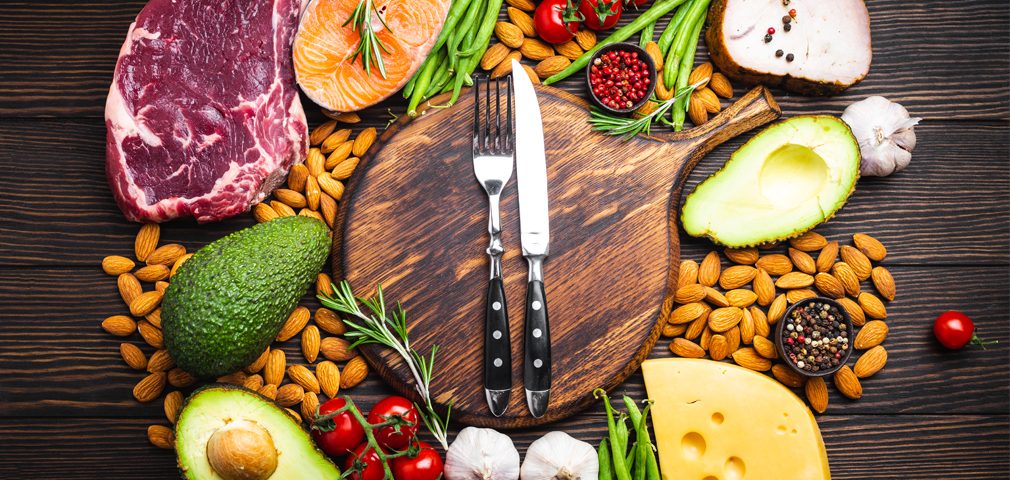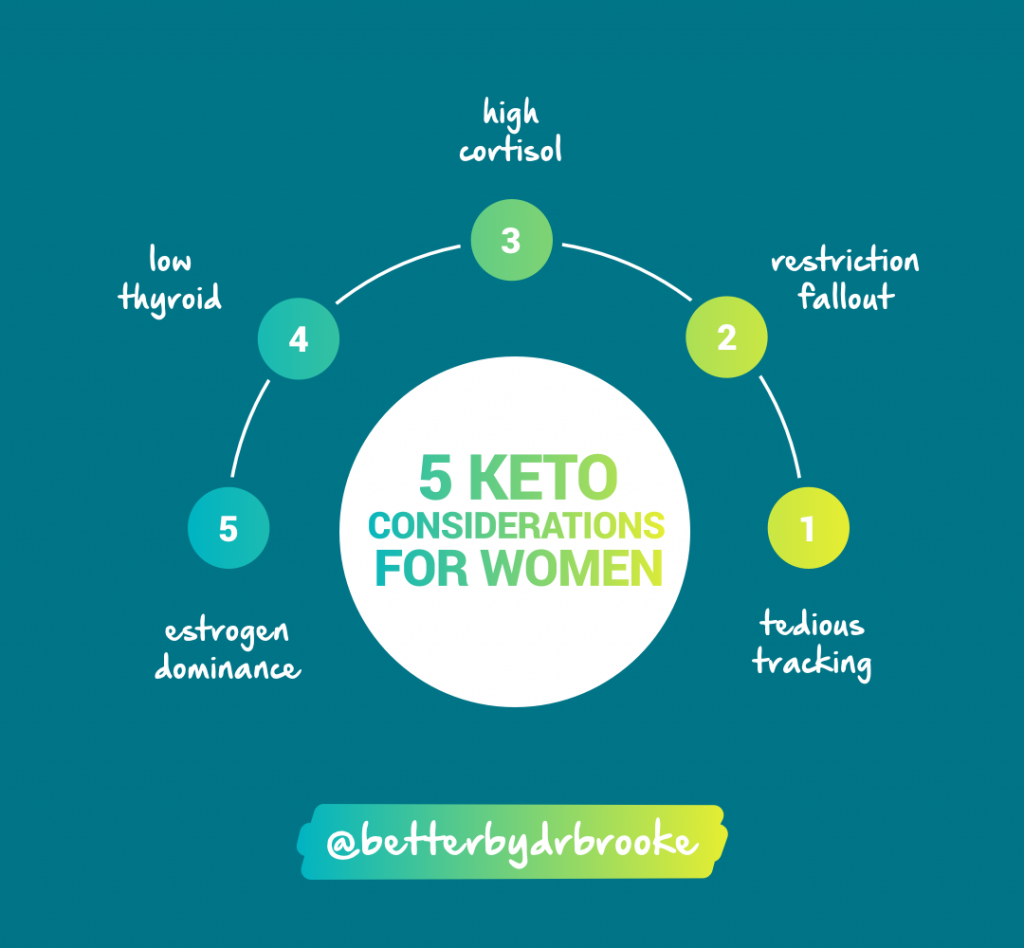
It’s been all the rage and chances are you know at least one woman that’s had great success going keto. It would be almost weird if you didn’t wonder, should I be doing it too?
The ketogenic diet is a powerful tool that can be helpful in lowering inflammation, banishing brain fog, resolving insulin resistance and losing stubborn fat. Unlike most “diets” that leave you hungry and fighting cravings, most people on keto report their hunger and cravings are almost nil.
Sounds pretty great right? But will it be so great for you?
It might be! But it may also be a real struggle for a variety of reasons that I’ll cover here. The first three are more hormonal and metabolic and the last two are more mindset misery that many of us have created from years of dieting, body image issues and food restriction.

Estrogen Dominance
The Keto Diet (as the name implies!) is high in fat and for most women doing this diet it’s a diet high in animal fat including full fat dairy, bacon, fattier cuts of meat, etc. This high animal fat intake isn’t a big deal for everyone, however, many women find that a diet high in animal fat worsens their estrogen dominance thanks to POPS or persistent organic pollutants, many of which have estrogenic activity.
These fat-soluble endocrine disruptors build up in our own body fat and the fat of the animals we eat. While grass-fed, pasture-raised, animal products are better than conventionally raised animal products, POPS are unfortunately ubiquitous in our modern environment and for some women will unfavorably shift estrogen metabolism.
If a keto or higher animal fat diet causes you to experience heavier or more painful periods, worsening of things such as fibroids, endometriosis, or PCOS or causes more painful breasts, you’ll want to consider getting most of your dietary fat essential to maintain keto from plant-based sources such as coconut, olives and olive oil, avocado, etc.
As we laid out in Hangry, for many women although not all, keto and even a Paleo diet, works best for their hormone balance if they keep fattier cuts of meat like marbled steaks, fattier ground beef, bacon, etc.,to no more than 1-2 times per week while keeping plant fat intake higher.
Cortisol & HPA Axis Dysfunction
If you’re already stressed out, meaning you have a lot of stress putting the heat on your HPA Axis (hypothalamic-pituitary-adrenal axis) and you then ask your body to be more metabolically flexible by shifting fuel sources from glucose to ketones, it may be more than your system can handle. The blood sugar battle that ensues between cortisol and insulin when our allostatic (AKA stress) load is high, can make it very hard to stay in ketosis as cortisol like carbs can raise your blood sugar and subsequently your insulin knocking you out of keto. In my clinical experience, women struggle with this more than men.
While it may seem like a keto diet is just about kicking carbs to the curb, stress is like another macro nutrient that gets overlooked in the keto equation.
The constant demand for cortisol thanks to stressors such as being overwhelmed, feeling unhappy, overtraining, lack of sleep, or any underlying inflammation or biochemical stress (i.e anemia or nutrient deficiencies) can make it hard to stay in ketosis because of cortisol and despite your very low carb intake.
Often women will cut those carbs, ramp up their fat as directed, and yet still struggle with prolonged “keto flu” (due to low insulin creating an electrolyte imbalance then made worse by low cortisol), or they don’t get those promised fat loss results and beat themselves up for failing, when the real problem is not that they aren’t keto-ing hard enough, it’s that right now keto is simply one more added stress on top of an already overburdened hormonal system.
So is keto a no go forever? Not necessarily, but it may not be the best fit right now and resolving stress should be job #1 for your hormones and metabolism. We cover all that in Hangry and you can see how to know in this article!
Low Thyroid
When you shift fuel from carbs to fats, which is the goal on keto, you will usually see a decrease in thyroid hormone and an increase in cortisol. This lowering of thyroid hormone may be simply an increase in efficiency of your metabolism being less reliant on glucose, but if you are already trending low thyroid, as so many women are, this may be hard for you to handle.
If you are low total active thyroid hormone (T3) due to being hypothyroid or having poor conversion (T4 to T3) or you have low available thyroid hormone (free T3) (i.e. due to estrogen dominance) you may struggle more in terms of low energy, brain fog, decreased exercise tolerance and less than stellar fat loss results on keto. Getting labs before you begin a keto diet can be helpful to sidestep this issue as you may be able to take steps to support thyroid function for better results.
Hormones leaving you feeling confused, frustrated or stuck?
If you’re ready to clear up the confusion and mixed messages you’ve heard about hormones, diet and exercise; to feel at home in your body at last; and to be healthy and happy again, welcome.
Work with Dr. Brooke
Tedious Tracking
Being successful on keto almost always means you’ll at least initially need to do a bit of detective work to find what macro combination works best, if you can tolerate more insulinogenic proteins like dairy to maintain keto, and how things like sleep and stress impact your ketone production.
Tracking your food, sleep, stress levels and measuring ketones via urine are a key part of knowing how to make this diet work for you, but after years of dieting, many women hate micromanaging their diet.
This can not only be a mental drain and trigger lots of dieting trauma, but many women are “keeping carbs super low” or “following a low carb Paleo approach” but are not fully in ketosis because. They are frustrated and not sure why it’ snot working but truth be told they assumed they were in ketosis but aren’t – and they never checked!
These women often stay in “metabolic no man’s land” where there is very little glucose around but they also aren’t making ketones, so they’re stuck feeling sluggish, can’t think straight, and can’t make it through a workout.
Tracking is tedious and many women just hate it, but it is really the only way to figure out what’s going on, especially at the start of a keto diet. If tracking and testing feel like too much work or harkens back to dieting misery of years gone by, keto may not be a good option for you.
Rife With Restriction
Shifting to a ketogenic diet means a lot of foods become off limits. Unfortunately, thanks to years of yo-yo dieting and restriction many women have a lot of triggers around giving up certain foods.
If you feel mired in unfairness, frustration or frequently find yourself going on keto every Monday and off it every Friday, the emotional toll of cutting out certain foods may make you feel more stressed out and upset than it’s worth. Maybe revisit this strategy at another time after you’ve worked on your mindset around finding what works for you.
So What’s A Keto-Curious Girl To Do?
Keto has appeal when it comes to fat loss, more energy and lowering inflammation but for some women, it’s simply not the right fit. Women are wise to shift away from polarizing opinions in health and nutrition and remember that diets, nutrition plans, avoidance of certain foods, focusing on particular macros while avoiding others, etc., is an answer, but not the answer for everyone.
Even a plan that is backed by research and/or works wonders for your girlfriend, does not mean it will work well for you. You’re not wrong or broken, it’s simply that we each have our own unique set of hormone imbalances, life stressors, mindset challenges, goals, and so forth.
What’s most important is understanding what does work for you when it comes to how a particular diet plan (like keto) might interact with your current hormonal landscape, and when you have the empowerment of this understanding, you’ll be less likely to jump into a new and enticing diet that simply won’t work for you in the long run.
Learn more about how to understand how a diet or exercise may impact your hormones as they stand today and whether it’s likely to work for you or not in this article.
How do you know if Keto is right for you?
To inquire about cortisol and thyroid you can get tested with your functional medicine provider and/or take my quiz here to get an idea how these hormones are doing. If they are OK, then you may be a good candidate to give keto a try.
As well, if you are up for restrictive nature of this diet and the struggles I mentioned above don’t seem to be to triggering for you, you may also want to give it a go!
If you’re diving in be sure to work with your provider to get some baseline labs, understand what nutrients you may need to help keto work better for you and get some understanding of how your metabolism will work with this diet so you can troubleshoot to do better or know when it’s time to give it up and try something new. Happy to help you, just email us for an appointment.
Hormones leaving you feeling confused, frustrated or stuck?
If you’re ready to clear up the confusion and mixed messages you’ve heard about hormones, diet and exercise; to feel at home in your body at last; and to be healthy and happy again, welcome.
Work with Dr. BrookeIf you’re not ready for a more aggressive plan like this but do want a framework to get started with – and one that will tend to ALL of your hormones – be sure to give Hangry a read!

